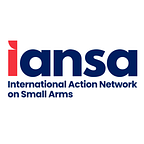Forgotten Communities: sexual and gender minorities and gun violence
Gun violence is an urgent, complex, and multifaceted problem. However, the issue and its linkages with gender, and gender responsive control are often overlooked. Amnesty International states that every day more than 500 people die from gun violence globally. And while men are the majority of the victims of gun violence, women, children and non–binary people are also victims and impacted in many indirect and often invisible ways.
In particular, gun violence against sexual and gender minorities (SGMs) is largely unexplored. This is certainly the case in Pakistan where gun violence targeted at SGMs is not an issue for many of government and non-government actors, despite it being a significant concern for these communities. Transgender communities have a high prevalence of self-harm, intimate partner violence, and victimization from hate crimes and discrimination in Pakistan. More than 90% of incidents of fatal violence against transgender and gender non-conforming people in Pakistan involve a gun.
In Pakistan, where according to media reports there are some 20 million legal and illegal weapons in the hands of individuals, the annual rate of homicide involving small arms is 9.18% per 100,000 population including 5.03% of female homicide. Murders by intimate partners and close family members in the name of honor is the most common form of homicide among women and the transgender community in Pakistan.
Women are more at risk of arms misuse in a domestic context. Like many other countries, in Pakistan it is common that guns are used to intimidate and perpetrate violence. According to government data, in Khyber Pakntunkhwa Province, 52% of women faced intimate partner violence, while in the Newly Merged Tribal Districts such violence was reported to be 66%. The majority of these incidents involved guns.
The possession and use of firearms are not only directly used to cause gender-based violence, but it also indirectly reinforces gender inequality. There is a strong correlation between carrying guns and notions of masculinity. To fully meet existing international norms relating to gender and gun violence, improving national and local gun laws can have important and positive consequences for smalls arms misuse control when analyzed from a gender perspective. Engagement with young men and boys to promote positive non-violent models of manhood through targeted programming as an early intervention can also have a positive impact in the prevention of gun violence.
Considerations of gender in addressing gun violence are necessary to develop evidence-based strategies and effective multifaceted solutions to counter the misuse of guns. Since armed violence impacts women, men, SGM communities, and girls and boys differently, the issue necessitates a comprehensive mainstreaming of gender perspectives into all dimensions of small arms control. Improved sex-disaggregated data collection through research and data analysis is vital to bridge the knowledge gap on who is killed or injured by firearms and under what circumstances in order to formulate gender-responsive strategies for small arms control.
Along with community-based problem-solving models, collaboration between government and non-government stakeholders is a pre-requisite to ensure gender inclusive prevention and responsive small arms control.
Sana Ahmad is a young emerging women and sexual and gender minority rights activist, having a law degree with a specialization in Human Rights. She is the provincial coordinator of Child Rights Movement (CRM) KP, represents Pakistan in the Global expert group on gender and HIV of EKHN, provincial coordinator of “Ujala Network”, supported by Amplify Change, a national campaign for social inclusion of wide range of marginalized groups, and legal advisor to TransAction (Provincial Alliance of Transgender Community) in Khyber Pakhtunkhwa.
This blogpost was written as part of IANSA’s “Civil society engagement in support of gender mainstreamed policies, programmes and actions in the fight against small arms trafficking and misuse, in line with the Women, Peace and Security agenda”, which is funded by the United Nations. This document was produced with the financial assistance of the United Nations through contributions received from the European Union. The views expressed herein are those of the Implementing Partner and do not necessarily reflect those of the United Nations or the European Union.
